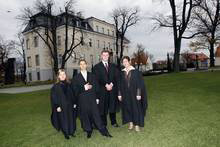‘Can enslavement be committed through forced labour?’ or ‘Is superior responsibility not precisely defined as a mode of liability?’ These were the kind of questions the seven teams had to deal with who participated in the third Model International Criminal Court (MICC) which took place in Krzyzowa/Poland from November 7 - 11, 2007.

Model International Court students in Krzyzowa/Poland – taking a break between the simulated court proceedings
Since 2005 MICC University aims at contributing towards the promotion of humanitarian law in theory and practice among students in Europe and beyond. The rationale behind the MICC is to sensitize university students to the work of the International Criminal Court and the values it promotes. The cases simulated are designed to encourage young people to explore the judicial mechanisms for pursuing the most important perpetrators of war crimes and the background against which these crimes happened.
The 33 students of the 2007 MICC formed seven teams - the judges, the defence and the prosecution teams for the Pre-Trial and the Trial Chamber proceedings pleading for and against the two accused - the fictitious Lucius General and Felix Boss. Further more, one team formed the press team reporting about the simulated court proceedings.
The participants came from eight different universities: Kyiv International/Ukraine, University of Sarajevo/Serbia and Montenegro, National Aviation University/Ukraine, Vilnius University/Lithuania, University of Cologne/Germany, University of Bucharest/Romania, Martin-Luther-University Halle-Wittenberg/Germany as well as from the University of Bydgoszcz/Poland.
The teams were already selected in summer on the basis of position papers on the case. Although the students knew the case thus well in advance, studied the material and literature on international criminal law, the teams were prepared by a team of experts on law and rhetorics in Krzyzowa. Thus, they had five very intense days with several legal and rhetorical training sessions preparing the teams for their respective role in the proceedings.
The proceedings before the Pre-Trial Chamber on Friday and before the Trial Chamber on Saturday were the highlights of the workshop. The students showed great ability to plead their respective case - divided into several concrete issues - with the relevant arguments.
But it was not only hard work, the program was rounded out by the showingof the movie ‘Some days in April’ on the International Criminal Tribunal on Rwanda, a guided tour through Kryzzowa and the farewell party after the announcement of the judgement.
The MICC is organized by the Kreisau Initiative Berlin e.V. in cooperation with the Krzyzowa Foundation for Mutual Understanding and ist greatly supported by the Foundation ‘Remembrance, Responsability and Future’.
The International Criminal Law Society is a partner of MICC. ICLS members were preparing the case for this session of the MICC and were members in the jury evaluating the teams in the simulated proceedings.